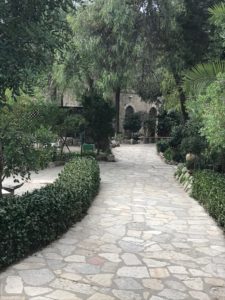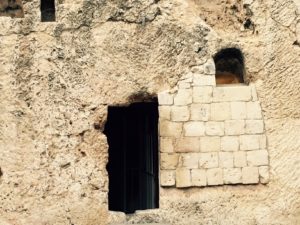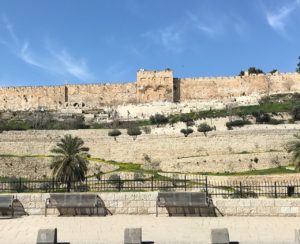The Silent Saturday between Good Friday and Resurrection Sunday seems to be skipped over. We want to skip over the agony and pain of Friday to quicken the miracle and joy of Jesus’ Resurrection, the event that defines us as Christians.
Now is the time to talk about it, talk about how to wait well in the silence. Each of us is waiting on something or someone.

Jesus was still and silent, after His agonizing crucifixion the afternoon before, with
Darkness falling over the whole earth;
the curtain of the temple tearing in half from top to bottom;
the earth shaking;
rocks splitting;
tombs opening;
dead bodies of the saints waking up and coming out of their tombs. (Matthew 27: 51-53)
The whole world was shaken. Sound familiar?
Jesus’ bloody body had been taken off the cross, wrapped in a clean linen shroud and embalmed with spices, “as is the burial custom of the Jews.” (John 19:40) Jesus’ body was laid in the new tomb of the rich man Joseph of Arimathea, which was positioned in a garden. (John 19: 40-42)
Even the minor detail of Jesus being laid in a rich man’s tomb in a garden fulfilled a 700-year-old+ prophecy:

“And they made his grave with the wicked and with a rich man in his death, although he had done no violence, and there was no deceit in his mouth.” –Isaiah 53:9
Matthew is the only Gospel to mention much activity on the day after crucifixion.
“The next day, that is after the day of Preparation, the chief priests and the Pharisees gathered before Pilate and said, ‘Sir, we remember how that imposter said, while he was still alive, ‘After three days I will rise. Therefore order the tomb to be made secure until the third day, lest his disciples go and steal him away and tell the people, ‘He has risen from the dead, and the last fraud will be worse than the first.’ Pilate said to them, ‘You have a guard of soldiers. Go, make it as secure as you can.’ So they went and made the tomb secure by sealing the stone and setting a guard.” –Matthew 28:62-66 ESV
What lessons can we learn from Jesus and the activities around His silence on Holy, Silent Saturday?
- When you are in God’s Will, there will always be nay-sayers. It’s not surprising that the chief Priests and Pharisees weren’t silent and continued to bash Jesus, even calling Him an “imposter.” I love that Pilate said make it as secure “as you can.” Deep down he knew no big stone or guard of soldiers could keep Jesus from rising on the third day.
- When Jesus seems silent and we wait, Jesus is still at work. Waiting is hard. Jesus is working as we wait. Keep persevering. “I believe that I shall look upon the goodness of the Lord in the land of the living! Wait for the Lord; be strong, and let your heart take courage; wait for the Lord!” Psalm 27:13-14 ESV.
- Experience peace and rest after the agony and before the miracle. I heard once the night is darkest right before the sunrise. Darkness and stillness precedes the miracle. The Gospel of Luke mentions rest after the crucifixion and right before the Resurrection passage that “On the Sabbath they rested according to the commandments.” –Luke 23:56
- Prevent analysis paralysis. In the silence we can be tempted to question and doubt God and ourselves. Is God mad at me? What did I do wrong? Why doesn’t God do something about this? In the silence and waiting is where trust in God is strengthened. Faith is stretched. Miracles are coming. Wait well, friend.
I’m thankful God saw fit to insert a Saturday between our Easter Fridays and Sundays. May we enjoy the silence. The miracle of Resurrection is upon us.

Reflection:
–How do we respond to the waiting in our lives?
–Are we waiting well?
Renew:
–“But they who wait for the Lord shall renew their strength; they shall mount up with wings like eagles; they shall run and not be weary; they shall walk and not faint.” –Isaiah 40:31









 Danya Jordan
Danya Jordan